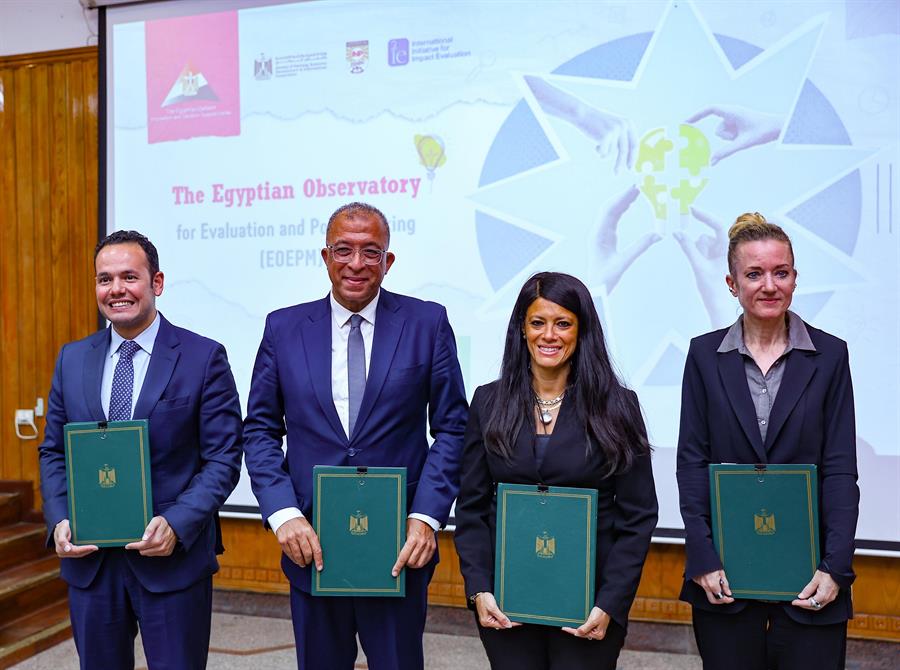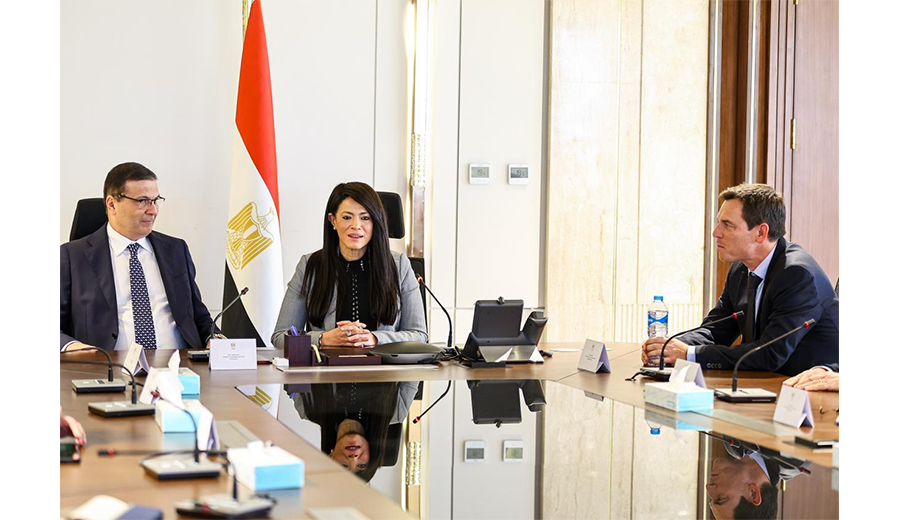The Ministry of Planning, Economic Development and International Cooperation, the Information and Decision Support Center, the Institute of National Planning, and the International Initiative for Impact Evaluation (3ie) sign an MoU to establish the “Egyptian Observatory for Evaluation and Policy Making.”

14 August 2025
H.E. Dr. Rania Al-Mashat: We provide strategic guidance in the fields of monitoring, evaluation, and impact measurement in line with the National Sustainable Development goals.
H.E. Dr. Rania Al-Mashat, Minister of Planning, Economic Development
and International Cooperation; Dr. Osama El-Gohary, Assistant to the Prime
Minister and Head of the Information and Decision Support Center (IDSC); Dr.
Ashraf El-Araby, President of the Institute of National Planning; and Dr. Marie
Gaarder, Executive Director of the International Initiative for Impact
Evaluation (3ie), signed a cooperation protocol to establish the “Egyptian
Observatory for Evaluation and Policy Making.” This aims to enhance and develop
monitoring and evaluation systems and frameworks within government institutions
and think tanks, ensuring their sustainability and effective application across
various sectors, in support of evidence-based policy-making and its
improvement, thereby contributing to increasing the efficiency of government
programs, achieving tangible developmental impact, and enhancing economic and
social welfare.
Al-Mashat stated that the protocol comes within the
framework of the Ministry’s mandate as the central authority responsible for
formulating, guiding, and following up on sustainable development strategies in
Egypt, and ensuring their consistency with Egypt’s Vision 2030 through
integrated planning frameworks, promoting evidence-based policy-making, and
developing institutional capacities in cooperation with national entities and
international development partners to support inclusive and sustainable economic
growth.
Al-Mashat explained that the Ministry is responsible for
monitoring and evaluating the performance of long-term, medium-term, and annual
sustainable development plans for all governmental entities, and providing
technical support in the fields of monitoring and evaluation in accordance with
Law No. (18) of 2022 on general planning for the state. The Ministry also
carries out its existing responsibilities in “program and performance
planning,” in addition to its role in preparing periodic reports to assess
progress made in achieving Sustainable Development Goals. As part of its role
in providing technical support to the state’s administrative apparatus, the
Ministry has prepared the “Procedural Guide for Monitoring and Evaluation,” in
collaboration with the United Nations Development Programme (UNDP).
H.E. added that, according to the protocol, the Ministry of
Planning, Economic Development and International Cooperation will provide
strategic guidance in the fields of monitoring, evaluation, and impact
measurement in line with national sustainable development goals, ensuring
alignment between research and evaluation priorities and developmental
priorities under Egypt’s Vision 2030, and
cooperate with the Institute of National Planning (INP) to develop
specialized training programs in monitoring and evaluation, as well as
coordinate with other entities affiliated with the Ministry, such as the Egypt
Impact Lab, the Central Agency for Public Mobilization and Statistics (CAPMAS),
and others and with various governmental entities to ensure the effective
integration of the observatory’s activities and the “evidence-based evaluation
and learning” methodology within the broader national framework for monitoring
and evaluation.
The Minister of Planning, Economic Development and
International Cooperation also pointed out the rich agenda that includes
anticipated laws such as the Planning Law and the Unified Public Finance Law,
which require assessment of the impact of government policies in their implementation,
in addition to continuing work on the structural reform program, which aims to
achieve macroeconomic stability, increase competitiveness, and green
transition, as well as ongoing initiatives such as the “Irada” initiative to
assess the impact of legal reforms, and new strategies such as the industrial
strategy.
For his part, Dr. Osama El-Gohary applauded the
establishment of the lab which is considered one of the components of the
"Government of the Future". He emphasized the importance of such labs
in supporting policies, as they will have a significant impact on strengthening
decision-making capabilities. He extended his special thanks to the Ministry of
Planning, Economic Development and International Cooperation for facilitating
the process of finding international partners, ensuring professional outcomes
and the commencement of joint work.
Dr. Ashraf El-Araby also commended the partnership with the
International Initiative for Impact Evaluation (3ie), confirming that it is a
key partner in this protocol. He noted that there is a rich research agenda
awaiting everyone, and that enhancing the research capacities of the state’s
administrative apparatus is a main objective of the initiative, affirming the
agreement among all parties to harness all resources to ensure its success.
Dr. Marie Gaarder expressed her happiness at this event, and
reviewed her institution’s experience in evaluating policy impacts in many
countries around the world, especially in Africa, confirming that this will
assist decision-makers make informed decisions.
This governmental partnership with the International
Initiative for Impact Evaluation (3ie) comes as one of the most prominent
international institutions specialized in supporting decision-makers through
providing an integrated system of impact evaluation tools, benefiting
governments, international organizations, donors, and charitable institutions,
with the aim of promoting evidence-based work. The initiative has extensive
cumulative experience in the production of research and evidence. It also
offers specialized services in evidence-based policies and practices,
contributing to enabling partners to design and implement more effective and
efficient programs and ensuring the sustainability of their impact on economic,
social, and developmental levels.
According to the cooperation protocol, the Information and
Decision Support Center will work on maximizing the benefit from the results of
evidence-based studies, impact measurement programs, and best international
practices in proposing optimal recommendations to support decision-makers on
various priority issues, proposing the research agenda, and identifying
priority research gaps for preparing studies and research projects according to
decision-makers’ visions, as well as hosting the Egyptian Observatory for
Evaluation and Policy-Making, and contributing to the preparation of necessary
research and studies by leveraging the expertise of researchers, academics, and
specialists, in addition to holding a series of workshops, training programs,
and initiatives.
The Institute of
National Planning (INP) will undertake the implementation of research
activities in various priority areas based on scientific evidence and best
practices and leading international experiences, contributing to preparing
research and studies, improving the quality of evidence-based research
activities, and future foresight in line with national priorities and global
trends. Additionally, it will develop specialized technical diplomas in the fields
of monitoring, evaluation, and impact analysis (MEL) for employees in the state
administrative apparatus, based on the institute’s expertise in designing and
delivering professional diplomas and awarding master’s degrees, thus
contributing to building and enhancing capacities and qualifying specialized
personnel in planning at both central and local levels.
Meanwhile, the International Initiative for Impact
Evaluation will provide reliable scientific evidence based on best
international practices in impact evaluation, contribute to supporting training
efforts according to international standards, and in partnership with reputable
international academic institutions, support the use and organization of
administrative data, and enhance the capabilities of those working in the field
of scientific evidence utilization, in collaboration with the first, second,
and third parties, as well as facilitate cooperation with international
institutions, allowing access to best global expertise and practices and applying
them in the local context.
It is worth noting that the Ministry of Planning, Economic Development and International Cooperation is responsible, based on the Planning Law No. (18) of 2022, for monitoring and evaluating sustainable development plans, and providing technical support in the areas of monitoring and evaluation.









